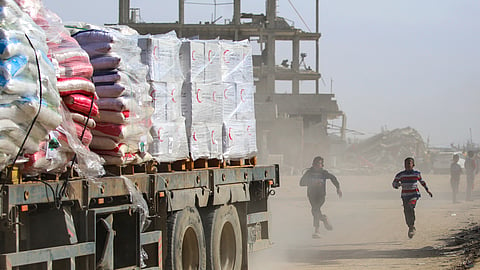

Israel on Sunday announced that it was suspending the entry of crucial supplies into Gaza, and threatened "consequences" for Hamas if it did not accept a proposal for a temporary extension of the first phase of the ceasefire instead of negotiations on the second phase, which demands a permanent pull out of Israeli military from Gaza.
"Prime Minister Benjamin Netanyahu decided that, from this morning, all entry of goods and supplies into the Gaza Strip will be suspended," his office said in a statement.
"Israel will not accept a ceasefire without the release of our hostages. If Hamas persists with its refusal, there will be other consequences," it said.
The action was lauded by Israel's far right lawmakers including Itamar Ben-Gvir, who has repeatedly called for Israel to stop letting any humanitarian aid enter into Gaza.
“Now is the time to open the gates of hell, cut off the electricity and water, return to war and most importantly – not settle for just half of the hostages, but to return to President Trump’s ultimatum – all hostages immediately or hell will be unleashed on Gaza,” he wrote on X.
“The decision to halt the entry of humanitarian aid until the hostages are returned is important and correct,” Israeli Education Minister Yoav Kisch posted on X.
Meanwhile, Hamas, in a statement, said Netanyahu’s decision to halt humanitarian aid into Gaza is “cheap blackmail” and a “coup” against the ceasefire deal.
Hamas described the move as “a war crime and a blatant attack on the agreement”, and urged the mediators to compel Israel to end punitive measures against Gaza.
The Palestinian group stressed that it “doesn’t respond to pressure.”
Israel’s decision to suspend aid shipments into Gaza “complicates matters and affects the negotiation process,” Al Jazeera reported senior Hamas official Sami Abu Zuhri as saying.
Any disruption in humanitarian aid will significantly affect the Palestinians, as the whole population is completely reliant on the already insufficient humanitarian relief entering the war torn territory. Besides, Israel's move to restrict aid comes amid the holy month of Ramadan, further exacerbating the crisis.
Israel's punitive measure follows the expiry of the first phase of its ceasefire with Hamas on Saturday, which included a surge in humanitarian assistance. The two sides have yet to negotiate the second phase, in which Israel requires to end its military operations in Gaza and Hamas requires to release all the remaining hostages.
Israel said earlier on Sunday that it instead prefers a proposal to extend the first phase of the ceasefire through Ramadan and Passover, or April 20.
It said the proposal came from the Trump administration's Mideast envoy, Steve Witkoff.
Under that proposal, Hamas would release half the hostages on the first day and the rest when an agreement is reached on a permanent ceasefire, according to Israeli Prime Minister Benjamin Netanyahu's office.
There was no immediate comment from the United States, Egypt or Qatar, who have been mediating between Israel and Hamas for over a year.